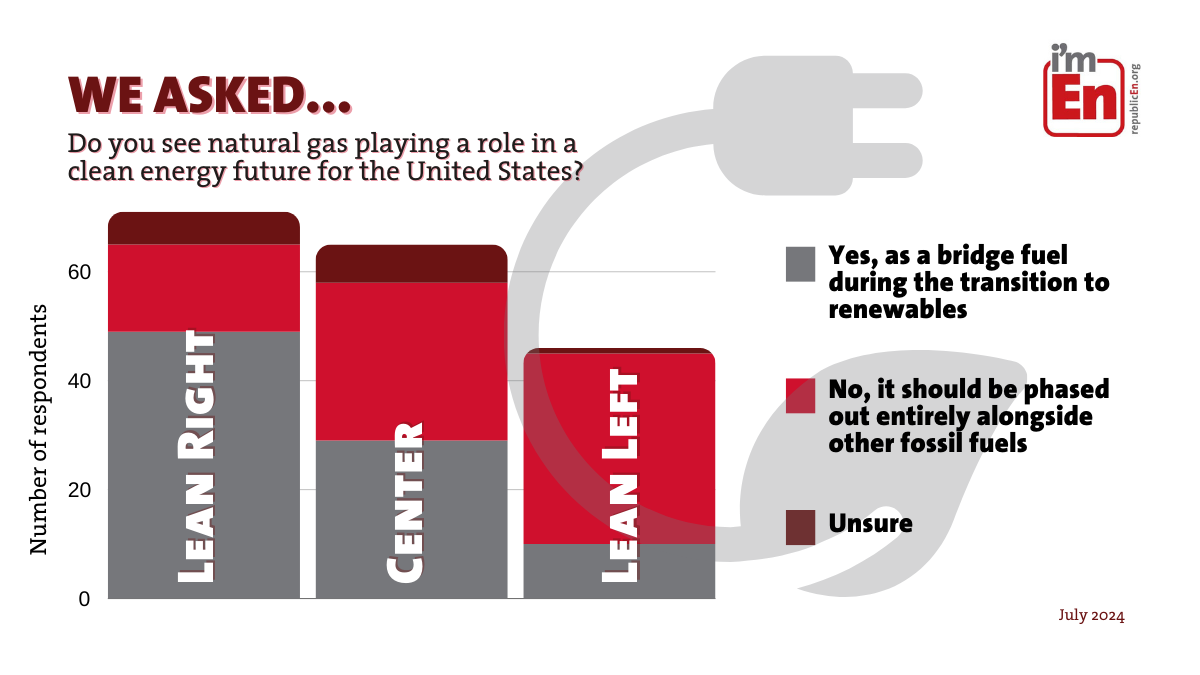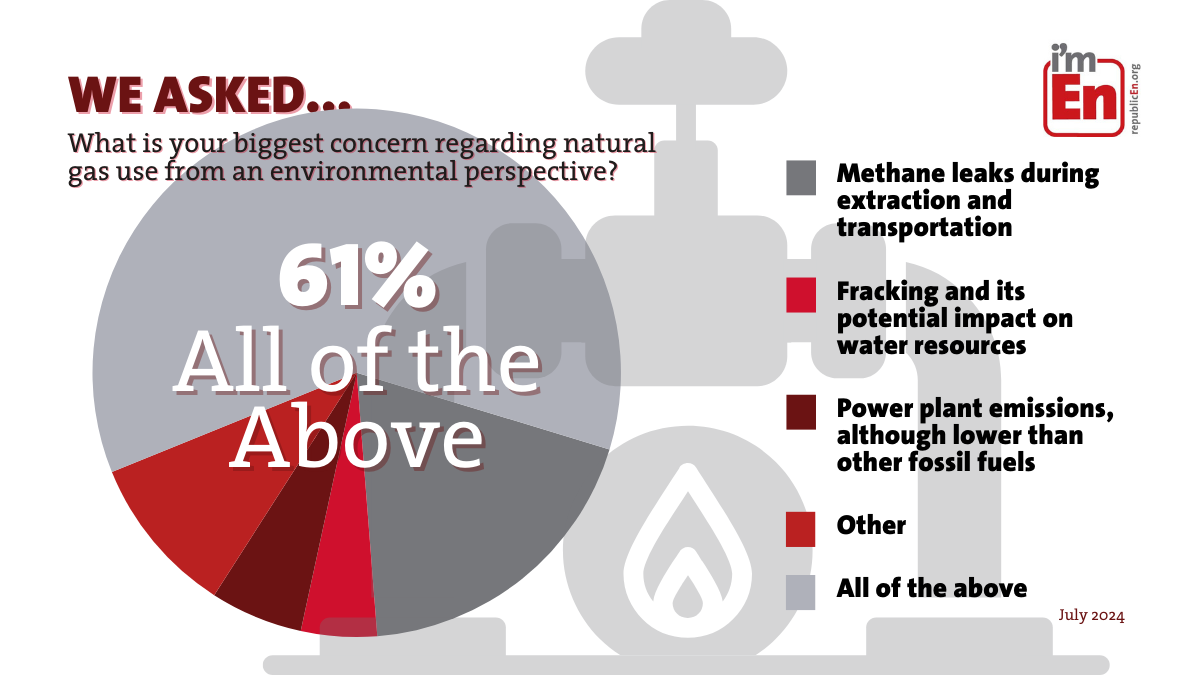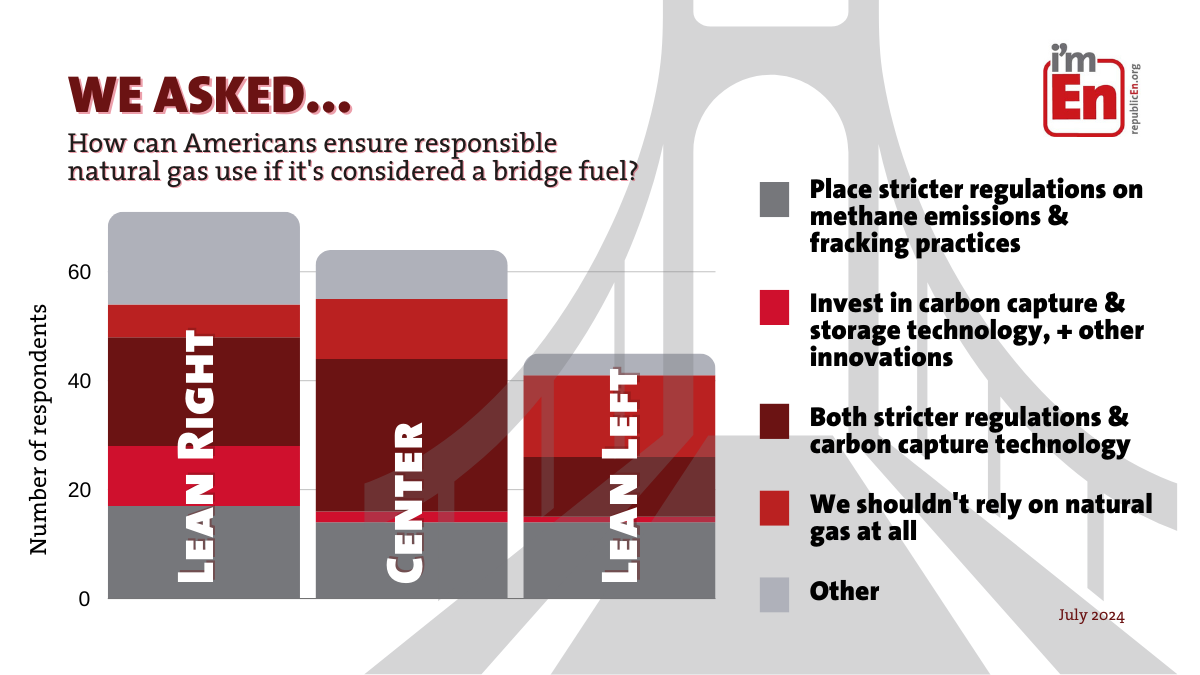We asked, “Do you see natural gas playing a role in a clean energy future for the United States?” From our Right-leaning pollees: 69% answered “Yes,” 23% answered “No,” and 8% answered “Unsure.” You can find full poll stats by scrolling to the bottom of the page.
Here at republicEn, we call ourselves “Energy optimists. Climate realists.” It’s never been a goal of ours to demonize the natural gas industry. After all, it’s cleaner than other fossil fuels such as coal and oil, and technological innovations like gas leak detection and carbon capture continually improve its use.
However, using natural gas as a bridge fuel as America transitions to cleaner energy has become a source of frustration for many. Some see the transition as not happening quickly enough, while others aren’t sure how long that transition should last – 10, 20, or 30 years?
I personally felt this frustration when my 70-year-old gas boiler needed replacing earlier this year. The reality of the situation was that retrofitting my home with an electric heat pump and ductwork was not an affordable option. The optimistic approach was to instead install an energy-star high-efficiency gas boiler and look forward to the technology advances of the future (I hear heat pump boilers are gaining popularity in Europe).
So we reached out to the EcoRight, asking, “How permanent of a ‘bridge’ do you want to build with natural gas?”
Here is what we found:
We asked, “What is your biggest concern regarding natural gas use from an environmental perspective?” 61% answered “All of the above,” 19% answered “Methane leaks during extraction and transportation,” 10% answered “Other,” 6% answered “Power plant emissions, ” and 5% answered “Fracking and its potential impact on water resources.”
Andrew B. in California shared, “I’m also concerned about the negative health effects associated with burning natural gas inside homes, particularly in gas ranges and also in appliances with less than ideal venting. Switching to electric induction for cooking, and heat pumps for HVAC, makes so much sense.”
We asked, “How can Americans ensure responsible natural gas use if it’s considered a bridge fuel?” From our Right-leaning pollees: 24% answered “Place stricter regulations on methane emissions and fracking practices,” 16% answered “Invest in carbon capture and storage technology and other innovations,” 28% answered “Both stricter regulations and carbon capture technology,” 8% answered “We shouldn’t rely on natural gas at all,” and 24% answered “Other.” You can find full poll stats by scrolling to the bottom of the page.
Here are shared thoughts and opinions from republicEn pollees:
-
-
- “I think we need to use natural gas over coal but it should be done with the knowledge that this is a temporary fix until we can build more nuclear, solar, wind, water, etc. energy sources. The issue is to balance investment into natural gas, knowing it’s not long term. And then what is the timeline – 10 years, 20 years, 30 years???” – Amy G. in Illinois
-
-
-
- “Energy ‘transition’ is a better approach to dealing with Climate Change. I refrain from saying ‘climate change’ because, regardless of my audience, most are willing to engage in discussions about increasing the supply of energy, transitioning to cleaner and less expensive choices, diversifying energy sources, etc. In my opinion, natural gas is a transitional energy source with a long term goal of sunsetting it for more beneficial alternatives.” – Glenn B. in Georgia
-
-
-
- “Restrictions now in place are adequate. Natural gas is the way to go in replacing coal and even some forms of oil. If state and Federal governments keep their eye on the ball to foster (not dictate) the development of renewables, then natural gas will be phased out by the marketplace. That’s my preference.” – Michael F. in California
-
-
-
- “A dangerous growing source of emissions: bitcoin mining at methane gas plants. These operations utilize “proof-of-work” (PoW) for verifying transactions, which is an extremely wasteful energy practice … especially when there are more energy-efficient options available for cryptocurrency mining. For example, “Proof-of-stake” uses 99.9% less energy than PoW. These relatively new sources of emissions need to be reined in now! We have energy efficiency standards for vehicles and appliances. Why not for bitcoin mining?” – Deborah G. in New York
-
-
-
- “[My] biggest concern is that over-reach on this (such as forced removal of natural gas appliances) will create an anti-environmental backlash.” – Bill L. in Washington
-
-
-
- “We should be putting our money and resources into other forms of energy. There are already options that would provide enough energy for our uses and wouldn’t harm the planet. We need to preserve the planet Earth if we are to survive as a species and evidence says climate change is progressing much faster than you think.” – Christie W. in Washington
-
-
-
- “We need a clear plan on how we can move to a carbon free future. I do not see a plan, only mandates.” – David V. in Iowa
-
-
-
- “Pricing emissions is the answer, as there will always be legitimate uses for natural gas – but we need the economy to be able to differentiate between productive and environmentally wasteful uses. If a robust emission price existed (rising and driving net emissions to zero) – and a market use still remained for natural gas, great. Pricing is needed to create a rational market that balances fossil fuel uses, environment, and sequestration. Until we have a price on emissions, we knowingly have a warped economic design accidentally designed to drive the results we are seeing in climate change. Physics will fix this in a harsh way for us, if we don’t choose to fix it ourselves.” – Matt W. in Texas
-
-
-
- “… Because it contributes so greatly to climate change, I believe current energy sources that emit GHG MUST move toward the same end as the horse and buggy.” – Den F. in Nevada
-
-
-
- “Atmospheric carbon capture is inefficient, but on-site carbon capture is efficient. Methane is potent but degrades. Anything is better than coal. I’m learning about this from my uncle, who is a refinery expert and very concerned about CO2.” – Cyndi B. California
-
-
-
- “Why aren’t you talking about SMR’s…Clean/ Safe Nuclear?” – Martha W. in Pennsylvania. Hi Martha, Check out the webinar we did last year on the future of nuclear. We also feature polls about nuclear energy from time-to-time.
-
-
-
- “I was in Pa. when the hydraulic fracturing boom overwhelmed legacy O&G regs in 2009-2010. I helped a Pa. environmental policy nonprofit evaluate the regulatory deficiencies and propose amendments. I am convinced that a more effective regulatory regime is possible. At the same time, there has been a nearly 15-year course of field research that indicates the need for better operational control. My view is that the motive of some of the research is anti-industry bias, but nonetheless, there is evidence of impacts that can and should be mitigated.” – Jack U. in Florida
-
-
-
- “The new EPA regulations on carbon capture should encourage the market to develop the market for that technology. Carbon capture should be implemented on existing gas plants. We may need some gas turbines that start quickly to fill in the gaps in intermittent solar and wind power.” – Jan B. in Tennessee
-
-
-
- “The best steps forward seem to be to me: 1. incentivize hybrid over electric vehicles, 2. move to natural gas for power generation over coal, 3. government action should focus on deregulation and acceleration of the nuclear sector to get to safe, reliable reactors QUICKLY (in govt terms at least)” – Ken N. in South Carolina
-
-
-
- “In the WSJ of 2019, 3649 economists signed a statement saying that a carbon fee and dividend policy is the most cost-effective solution for our economy and our country. A well-designed free market, revenue-neutral solution corrects a well-known market failure. https://clcouncil.org/economists-statement/” – Leslie S. in Iowa
-
-
-
- “States should use the standards in Colorado for methane management. We should invest in nuclear energy as the next big future generating source for both electricity and other power needs in the US. Okay, for R&D on carbon capture with an eye to exporting that technology for countries not suitable for nuclear power.” – Lois M. in Colorado
-
Poll answers represent republicEn members across 43 states (including Alaska and Hawaii!). Texas submitted the most responses, with California coming in second. The political leaning of poll takers: 37% lean right, 34% claim center, 24% lean left, and 5% are unsure or prefer not to say.
Every month, republicEn seeks to better understand conservatives who care about climate change by asking 3 important questions to the EcoRight.
Full poll stats:
Question 1: We asked, “Do you see natural gas playing a role in a clean energy future for the United States?”
- From our Right-leaning pollees: 69% answered “Yes, as a bridge fuel during the transition to renewables,” 23% answered “No, it should be phased out entirely alongside other fossil fuels,” and 8% answered “Unsure;”
- From our Center-leaning pollees: 45% answered “Yes, as a bridge fuel during the transition to renewables,” 45% answered “No, it should be phased out entirely alongside other fossil fuels,” and 11% answered “Unsure;” (Percentages do not add up to 100 due to rounding);
- From our Left-leaning pollees: 22% answered “Yes, as a bridge fuel during the transition to renewables,” 76% answered “No, it should be phased out entirely alongside other fossil fuels,” and 2% answered “Unsure.”
Question 2: We asked, “What is your biggest concern regarding natural gas use from an environmental perspective?” 61% answered “All of the above,” 19% answered “Methane leaks during extraction and transportation,” 10% answered “Other,” 6% answered “Power plant emissions, although lower than other fossil fuels, ” and 5% answered “Fracking and its potential impact on water resources.”
Question 3. We asked, “How can Americans ensure responsible natural gas use if it’s considered a bridge fuel?”
- From our Right-leaning pollees: 24% answered “Place stricter regulations on methane emissions and fracking practices,” 16% answered “Invest in carbon capture and storage technology and other innovations,” 28% answered “Both stricter regulations and carbon capture technology,” 8% answered “We shouldn’t rely on natural gas at all,” and 24% answered “Other;”
- From our Center-leaning pollees: 22% answered “Place stricter regulations on methane emissions and fracking practices,” 3% answered “Invest in carbon capture and storage technology, and other innovations,” 44% answered “Both stricter regulations and carbon capture technology,” 17% answered “We shouldn’t rely on natural gas at all,” and 14% answered “Other;”
- From our Left-leaning pollees: 31% answered “Place stricter regulations on methane emissions and fracking practices,” 2% answered “Invest in carbon capture and storage technology and other innovations,” 25% answered “Both stricter regulations and carbon capture technology,” 33% answered “We shouldn’t rely on natural gas at all,” and 9% answered “Other.”



